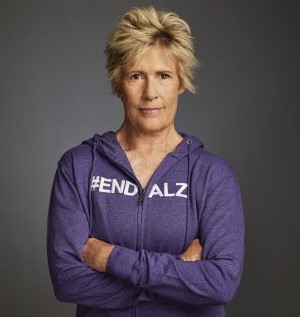
Triple Your Impact This Holiday Season
Triple Your Impact This Holiday Season
Celebrate the holidays with a year-end gift that can go 3x as far to help provide care and support to the millions affected by Alzheimer's disease, and to advance critical research. But please hurry — this 3x Match Challenge ends soon.
Donate NowQ&A with History-Making Swimmer Diana Nyad: "The Next Generation Will Have a Better Path"
Diana Nyad is a world-renowned long-distance swimmer, author, broadcaster and speaker. In the 1970s, she became known as the world's greatest long-distance swimmer with her open-water achievements, including a record-breaking swim around Manhattan. On Sept. 2, 2013, at the age of 64, Diana Nyad became the first person to swim from Cuba to Florida without the aid of a shark cage, swimming 110.86 miles in 53 hours. Her bestselling memoir "Find a Way" was dramatized in the 2023 Netflix feature film "Nyad."
Diana, tell us about your connection to Alzheimer's disease.
My mom, Lucy, developed Alzheimer's in her late 60s. She died at 82. We were heartbroken to see this lively, articulate woman devolve, but she never came to a point of not recognizing me or my sister. She still had some sort of affectionate feeling and connection in this world.
Do you recall the first time that you were worried something was wrong with your mom?
My mom was a ballroom dancer. Lucy could do a Chacha! While I was living in California, my mom's dance teacher called and said, "I'm so worried about Lucy." She had been on the I-95 freeway in Fort Lauderdale driving in the wrong direction. Cars are going 80 miles an hour, and she's going in the wrong direction. I flew to Florida right away.
My mom had always been very neat and fastidious about her papers and letters. When I got to her house, I opened her desk drawer. It was a mess, stuffed with unopened bills and crumpled-up letters. She hadn't been paying her bills and had been writing big, inaccurate checks to people. People were soliciting her to turn off her electricity.
I felt guilty that I hadn't noticed that she had been regressing. We used to speak on the phone every Sunday. I should've known, but even in our conversations, I thought she was being funny and a little eccentric because that's how she was.
Do you have advice for family caregivers who are caring for a loved one living with Alzheimer's or another dementia?
It's important to remind yourself that nobody who has Alzheimer's — no matter what stage of the disease they're going through — is acting the way they are to frustrate you. With my mom, we would finish lunch and she would say, "Let's go to breakfast." My sister and I decided not to be upset and not to be judgmental. Having compassion and trying not to get frustrated is key. Your loved one may not remember if they had breakfast or if they had lunch, but just go with it. Be gentle with them.
 Is there a moment from your childhood that you cherish with your mom?
Is there a moment from your childhood that you cherish with your mom?
My mom was French and one of the biggest, fondest and warmest memories of my whole life was her reading "Babar" to me in French. Her accent was so melodious, so perfect. She would cuddle up with me at night and read me the stories of the little elephant who usually wore a green suit. I'll never forget it. It is a kernel of the sweetness of my life.
In my mom's last couple of years, I took the very same books she read me as a child. We'd sit up against the backboard of her bed, and I'd open the book and tell her how I loved it when she read to me as a child. When I read the stories to her, she had that same magical reverie in her ears that I experienced hearing them when I was a young child. It was a circular connection we shared.
Recent research suggests that healthy lifestyle habits such as exercise, social engagement and learning new skills are good for the brain. What does a healthy lifestyle mean to you?
I live my life by the phrase "the body is a temple." I can't speak about Alzheimer's in a clinical way, but I know that our minds benefit when our muscular system, our heart, our lungs and our energy are in shape.
Right now, there's a lot of momentum around Alzheimer's treatments, diagnosis and research. Does that give you hope for the future?
I think we are on the precipice in many areas of medicine — solving, slowing, diagnosing earlier. And Alzheimer's is right there at the forefront of discovery. I'm 75, but I have no doubt that I'll live to be 100 or so. In the 25 years coming, I also have no doubt that there will be gigantic strides in Alzheimer's treatment.
Millions of families experience the devastation of this disease. People who were once so vibrant, energetic, funny, intelligent — they unravel, slipping further away from themselves. But I have hope that the next generation will have a better path.
